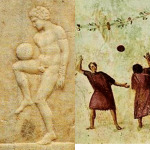Gambling, betting and board games are still very popular today. As it turns out, gambling was also extremely popular in ancient Rome, as evidenced by the numerous game boards found in the areas of the former Roman Empire. It is worth adding that enthusiasts of board games were called “dicemen” (alaetores).
Interestingly, the Roman emperors themselves could not hide their weakness for board games and betting. Thanks to Suetonius’ messages, we know that Emperor Claudius was an avid gamer, who was said to have written his own book on the game of dice. What’s more, he had a specially prepared car in which he could play “board games” during the trip. Augustus also loved gambling; reportedly he invited guests to the palace and handed them pouches with money so that he could play with them.
Naturally, gambling was not only popular among the upper classes of society. Board games were also played in pubs and legion camps. However, this was not accepted by the elite, who tried to limit the practice on a larger scale through, inter alia, laws regulating gambling. The main concern was that a potential poor Roman might make a real fortune thanks to a lucky throw; just like the famous Roman hero of the song “Satyricon” – Trimalchio did. The authorities feared that the enormous wealth of the wrong people could threaten the social, and above all political, order. It is worth giving here an example of a mural from Pompeii, where – probably the winner – decided to boast about his impressive win. The man was to win 855 and a half denarius, which equated to a legionary’s pay in four months. Such a one-time big (for an ordinary citizen) win encouraged further games.
As mentioned earlier, to this day, more game boards are found. Scientists are still trying to understand how the ancient Romans played their “board games”. It is difficult because no instructions, pieces or cards have survived; therefore, there were many hypotheses and proposals among researchers. It is worth mentioning that instead of the fields that appear in the current board games, the pawn in the ancient “board games” moved around the letters of the alphabet. These letters are arranged in such a way that you can make words of six letters out of them. In this way, the following messages can be created from the various boards found:
- “Dirty dots on the dice force even a skilled player to give up on luck” (INVIDA PUNCTA IUBENT FELICE LUDERE DOCTUM)
- “The board is a circus. Back off when you’ve been beaten. You can’t play” (TABULA CIRCUS BICTUS RECEDE LUDERE NESCIS)
- “Parthians slain, Brit beaten, play on, Romans” (PARTHI OCCISI BRITTO VICTUS LUDITE ROMANI)
- “The circus is full, people are shouting, the citizens are merry” (CIRCUS PLENUS CLAMOR POPULI GAUDIA CIVIUM)
- “Hunt, bath, play, laugh: that’s what life is called” (VENARI LAVARE LUDERE RIDERE OCCEST VIVERE)
The above slogans perfectly show that the game of dice was a form of escape from everyday life for a typical Roman. Moreover, we get to know the ancients’ way of thinking and their sense of humour.







